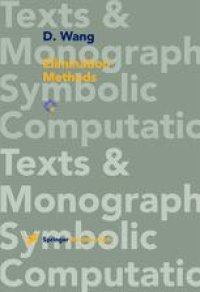
Ebook: Elimination Methods
Author: Dr. Dongming Wang (auth.)
- Tags: Symbolic and Algebraic Manipulation, Convex and Discrete Geometry, Manifolds and Cell Complexes (incl. Diff.Topology), Artificial Intelligence (incl. Robotics)
- Series: Texts and Monographs in Symbolic Computation
- Year: 2001
- Publisher: Springer-Verlag Wien
- Edition: 1
- Language: English
- pdf
The development of polynomial-elimination techniques from classical theory to modern algorithms has undergone a tortuous and rugged path. This can be observed L. van der Waerden's elimination of the "elimination theory" chapter from from B. his classic Modern Algebra in later editions, A. Weil's hope to eliminate "from algebraic geometry the last traces of elimination theory," and S. Abhyankar's sug gestion to "eliminate the eliminators of elimination theory. " The renaissance and recognition of polynomial elimination owe much to the advent and advance of mod ern computing technology, based on which effective algorithms are implemented and applied to diverse problems in science and engineering. In the last decade, both theorists and practitioners have more and more realized the significance and power of elimination methods and their underlying theories. Active and extensive research has contributed a great deal of new developments on algorithms and soft ware tools to the subject, that have been widely acknowledged. Their applications have taken place from pure and applied mathematics to geometric modeling and robotics, and to artificial neural networks. This book provides a systematic and uniform treatment of elimination algo rithms that compute various zero decompositions for systems of multivariate poly nomials. The central concepts are triangular sets and systems of different kinds, in terms of which the decompositions are represented. The prerequisites for the concepts and algorithms are results from basic algebra and some knowledge of algorithmic mathematics.
This book provides a systematic and uniform presentation of elimination methods and the underlying theories, along the central line of decomposing arbitrary systems of polynomials into triangular systems of various kinds. Highlighting methods based on triangular sets, the book also covers the theory and techniques of resultants and Gr?bner bases. The methods and their efficiency are illustrated by fully worked out examples and their applications to selected problems such as from polynomial ideal theory, automated theorem proving in geometry and the qualitative study of differential equations. The reader will find the formally described algorithms ready for immediate implementation and applicable to many other problems. Suitable as a graduate text, this book offers an indispensable reference for everyone interested in mathematical computation, computer algebra (software), and systems of algebraic equations.
This book provides a systematic and uniform presentation of elimination methods and the underlying theories, along the central line of decomposing arbitrary systems of polynomials into triangular systems of various kinds. Highlighting methods based on triangular sets, the book also covers the theory and techniques of resultants and Gr?bner bases. The methods and their efficiency are illustrated by fully worked out examples and their applications to selected problems such as from polynomial ideal theory, automated theorem proving in geometry and the qualitative study of differential equations. The reader will find the formally described algorithms ready for immediate implementation and applicable to many other problems. Suitable as a graduate text, this book offers an indispensable reference for everyone interested in mathematical computation, computer algebra (software), and systems of algebraic equations.
Content:
Front Matter....Pages i-xiii
Polynomial arithmetic and zeros....Pages 1-20
Zero decomposition of polynomial systems....Pages 21-51
Projection and simple systems....Pages 52-83
Irreducible zero decomposition....Pages 84-106
Various elimination algorithms....Pages 107-150
Computational algebraic geometry and polynomial-ideal theory....Pages 151-177
Applications....Pages 178-231
Back Matter....Pages 232-244
This book provides a systematic and uniform presentation of elimination methods and the underlying theories, along the central line of decomposing arbitrary systems of polynomials into triangular systems of various kinds. Highlighting methods based on triangular sets, the book also covers the theory and techniques of resultants and Gr?bner bases. The methods and their efficiency are illustrated by fully worked out examples and their applications to selected problems such as from polynomial ideal theory, automated theorem proving in geometry and the qualitative study of differential equations. The reader will find the formally described algorithms ready for immediate implementation and applicable to many other problems. Suitable as a graduate text, this book offers an indispensable reference for everyone interested in mathematical computation, computer algebra (software), and systems of algebraic equations.
Content:
Front Matter....Pages i-xiii
Polynomial arithmetic and zeros....Pages 1-20
Zero decomposition of polynomial systems....Pages 21-51
Projection and simple systems....Pages 52-83
Irreducible zero decomposition....Pages 84-106
Various elimination algorithms....Pages 107-150
Computational algebraic geometry and polynomial-ideal theory....Pages 151-177
Applications....Pages 178-231
Back Matter....Pages 232-244
....